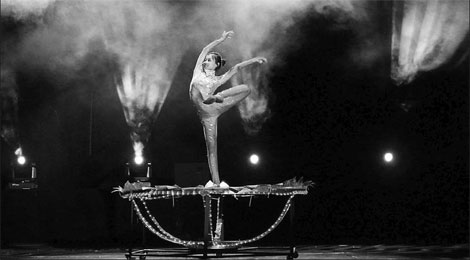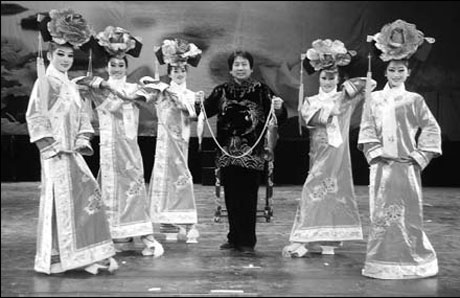Private troupe stands tall in performing art market
A private troupe shows what it takes to make it in the nation's performing arts market.
 |
|
A performer from the Beijing Xueming Art Troupe showcases her talents at the China Puppet Theater. [China Daily] |
A magician pulls out a live fish from the pocket of a stunned member of the audience. He then makes his assistant float and suddenly disappear. The crowd breaks into wild applause.This is the Beijing Xueming Art Troupe showcasing its talents at the China Puppet Theater.
At a time when State-owned organizations are struggling to stay afloat, many private ones like the Xueming troupe are gradually consolidating their position in the nation's performing arts market.
|
|
|
Tian Xueming, the troupe's founder and head, performs a magic show. [China Daily] |
Its shows, a combination of traditional Chinese magic, Western-style illusion, Sichuan-opera mask-changing, Shaolin kungfu and acrobatics, are becoming increasingly popular with foreign tourists.
One of them is 17-year-old Marlema Hoffman, from the United States who is visiting Beijing with her parents and younger sister.
She was at the theater on the recommendation of her tour guide. "These performers are so talented," she gushed.
While some had learned of the troupe from the Internet and other media channels, most had been brought to the theater by travel agencies.
Founded in 2000, the Beijing Xueming Art Troupe is the city's first registered privately-owned professional performing arts troupe.
Over the past decade, it has grown from eight performers to 120 at present. The number even touched 165 in 2007.
"We faced tough times," says Tian Xueming, 46, the troupe's founder and head.
Tian was once a martial arts performer with the Beijing Hebei Clapper Opera Troupe, a State-owned organization.
However, he did not see the future holding out much promise even after five years of professional vocal and martial arts training. The decline of traditional opera and low earnings forced him to look for alternatives.
Tian had been learning various traditional arts such as magic and qigong (a system of physical and mental training based on breath control), since 1991.
In 1996, he quit his job and began to travel around Southeast Asia and Europe.
Over two years, Tian performed on various occasions such as Spring Festival temple fairs. Recognition for his talents and his earnings both greatly exceeded his expectations.
That is when the idea of establishing his own troupe sprouted in his mind.
In May 2000, Tian applied for a performance license, gathered his brothers and nephews and the Beijing Xueming Art Troupe was born.
They rented the Yunlong Tea House in Beijing's Grandview Garden and held six daily performances. Tian says they perfected their representative acts - the magic and qigong demonstration - during this period.
With a view to attracting more people the troupe decided to enter the tour performance market in 2003.
"However, no travel agency wanted to cooperate with a barely-known troupe," Tian recalls.
Not that this discouraged them. Troupe members planted themselves at all the major tourist draws of Beijing and handed out pamphlets to every passing tour group.
Whenever anyone showed the slightest interest, they would rush to present everything they had - for free.
Their talent and sincerity soon won them travel agency partners.
Since late 2004, the troupe has tied up with more than 30 travel agencies. Besides high quality performances, Tian attributes the success of his troupe to a bold move in 2004.
In the beginning, the troupe was like an extended family, with all the work being shouldered by Tian, his brothers, nephews and other relatives.
"With the troupe going professional, it was important to make the distinction between relative and staff," Tian says.
To facilitate the troupe's growth, he decided to hire outside professionals. The move paid off.
In 2006, the Beijing Xueming Art Troupe won 360,000 yuan ($53,000) in prize money from the local government after being voted "Beijing's excellent performance troupe". It also toured many foreign countries such as Egypt, Australia and Spain, and participated in various important events like the Olympic countdown gala.
At present, the troupe holds performances at Beijing Theater and China Puppet Theater.
Their more than 1,000 performances bring in 10 million yuan in a good year.
"Unlike State-owned art organizations, we have no choice but to keep going," says Tian. "We are like wild animals; if we don't figure out how to survive, we will die."
The private troupe is more flexible and not afraid of losing face. It is not picky about where it performs.
Private troupes can also respond quickly to changing market needs, Tian adds. Whenever they see a new trend catching on, they can quickly include it in their repertoire to maintain its freshness.
Li Pengjun, vice-president of China Puppet Theater, expresses confidence in its eight-year contract with the Beijing Xueming Art Troupe.
The China Puppet Theater too became a private organization in 2006 and its cooperation with private performance troupes is proving to be a winning combination.
"But private troupes still have it tougher than State-owned ones, which receive financial support from the government," says Li. "Macro policy support, long-term planning, and quality shows are key to ensuring their continued growth."
 0
0 








Go to Forum >>0 Comments